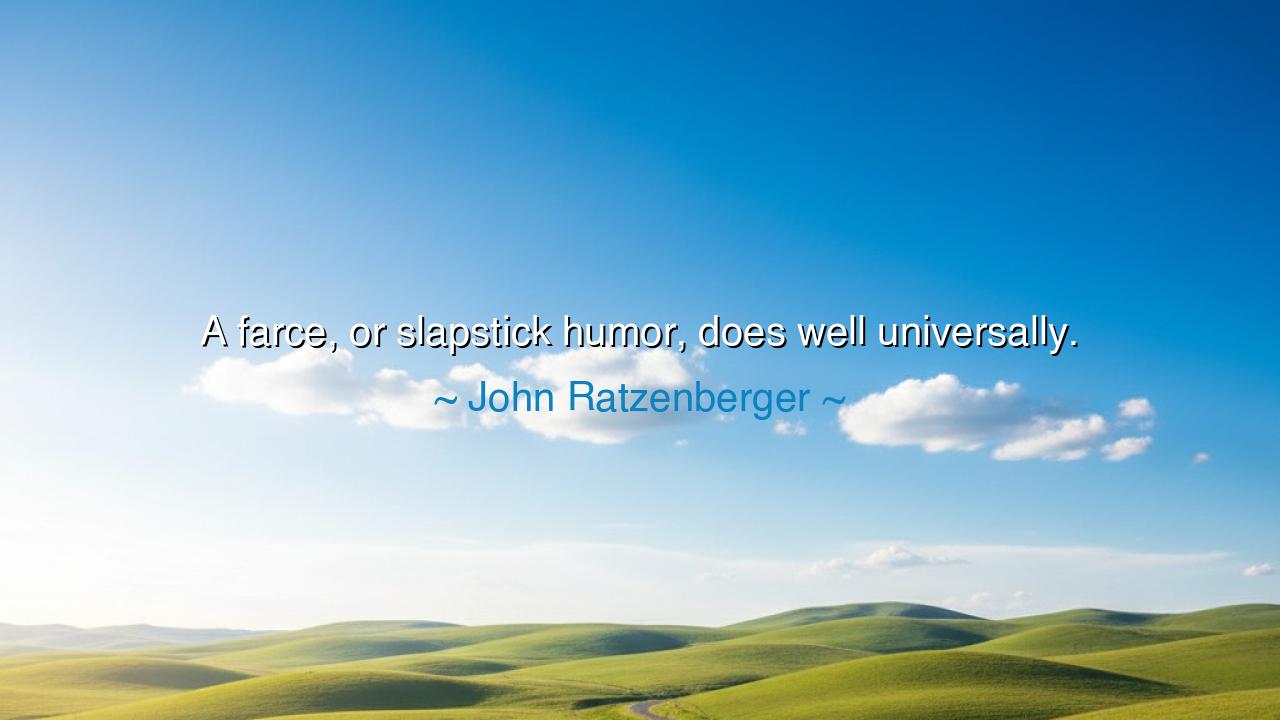
A farce, or slapstick humor, does well universally.






The actor and storyteller John Ratzenberger, whose voice and presence have animated both laughter and wisdom, once declared: “A farce, or slapstick humor, does well universally.” In this brief and humble reflection lies a truth that transcends time, culture, and language — the truth that laughter born of physical comedy, of folly and motion, is a language older than words. Ratzenberger, a man who has built a career upon warmth and wit, speaks here not merely of entertainment, but of connection — the mysterious and sacred power of laughter to unite hearts across every barrier of nation, belief, or tongue.
When he speaks of farce and slapstick, he is invoking one of the oldest traditions in the history of human expression. Long before poetry was written or philosophy spoken, men and women laughed at the same simple truths: the clumsiness of pride, the comedy of chance, the foolishness of human vanity. The gestures, the pratfalls, the exaggerated reactions — these needed no translation. Whether in a Roman amphitheater, a Japanese stage, or a village square in Africa, such laughter echoed the same message: we are all human, and therefore ridiculous. It is laughter that strips away the masks of power, laughter that humbles the mighty and comforts the meek.
To call this humor “universal” is to recognize its sacred equality. It speaks not to intellect, but to instinct; not to culture, but to the heart. The ancients understood this well. In the streets of Athens, the playwright Aristophanes mixed political satire with slapstick — for even in a democracy of thinkers, he knew the body’s stumble and the fool’s grin could reach those whom argument could not. In ancient Rome, the comedian Plautus wrote plays filled with confusion, disguise, and chaotic energy, delighting emperors and peasants alike. And in the Italian commedia dell’arte, centuries later, the masked clowns of Venice and Florence made kings laugh beside beggars. Across all these eras, slapstick was not mindless — it was miraculous, a reminder that laughter could equalize the world.
Consider the tale of Charlie Chaplin, the silent prophet of the twentieth century. With nothing but movement — a shuffle, a fall, a twirl of his cane — he spoke to every nation. The tramp he played was at once comic and tragic, foolish and wise. Through slapstick, Chaplin conveyed compassion; through farce, he revealed dignity. His films crossed borders that politics could not. In the midst of the Great Depression and war, when the world groaned with sorrow, his humor lifted spirits and reminded humanity that joy still lived within us. Such is the universal power of farce that Ratzenberger honors — the power to bind all people in laughter, to heal the spirit through the simplicity of mirth.
There is a hidden wisdom in this kind of humor — for while satire and intellect often divide, slapstick unites. The scholar may laugh at wit, the philosopher at irony, but the child, the farmer, the widow, and the wanderer all laugh at the fall of the pompous man, the surprise of the pie in the face, the fool who dares to keep trying despite failure. Farce touches the innocence in us, the part unburdened by cynicism or superiority. It asks us to remember that life itself is clumsy and chaotic — and that it is better to laugh than to despair.
The lesson of Ratzenberger’s insight is profound: in a world increasingly divided by language, belief, and ideology, humor remains one of the last bridges between us. Seek not always the humor that criticizes or divides, but the humor that connects, that humbles, that allows others to breathe. Remember that laughter shared is peace made manifest. If you would heal tension, if you would remind the weary of their shared humanity, choose laughter that welcomes all. The simple jest, the gentle fall, the comic misstep — these can carry more love than the cleverest words.
So, children of this restless world, remember the ancient truth: laughter is a language of the soul, and farce its purest dialect. When words fail, let gestures speak. When divisions rise, let laughter dissolve them. For as John Ratzenberger teaches, the simplest kind of humor — the kind that needs no translation, that draws smiles from the wise and the simple alike — is not trivial, but divine. It reminds us that to be human is to stumble, to laugh, and to rise again — together.






AAdministratorAdministrator
Welcome, honored guests. Please leave a comment, we will respond soon